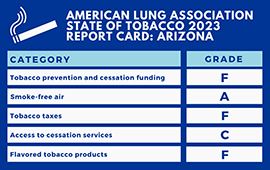- Slug: BC-CNS-Lung Report, 950.
- 2 photos, graphic available (thumbnails, captions below)
By Jeremy Yurow
Cronkite News
PHOENIX – Arizona lags behind in policies that prevent and reduce tobacco use, according to the American Lung Association’s annual “State of Tobacco Control” report. The state received failing grades in three of five categories and did not improve on any of its grades from last year.
The report, released Wednesday, gave the state an A for the strength of its smoke-free workplace laws and a C for its coverage and access to tobacco cessation services.
JoAnna Strother, senior director of advocacy at the American Lung Association in Arizona, said the state received high marks for workplace laws thanks to the Smoke-Free Arizona Act, which voters passed in November 2006. The law, which became effective in May 2007, prohibits smoking in most enclosed places and most places of employment.
“Tobacco remains the leading cause of preventable death and disease in America,” Strother said. “We developed the report to give a grading system to correct tobacco policies in each state, to show that there is room to do better and to continue to protect Americans.”
Strother noted that Arizona received a C for its coverage and access to tobacco cessation services for several reasons. She praised the state Medicaid system for offering seven medications to help smokers quit, including Chantix and Zyban, as well as nicotine patches, gum, inhalers, nasal spray and lozenges. She also gave credit to the state’s Ashline hotline, which offers over-the-phone counseling for people who are trying to quit.
However, Strother said a barrier in Medicaid coverage still needs to be addressed.
“Sometimes their barriers are the number of times per year (smokers) can have a quit attempt,” Strother said. “You don’t want to put a limit on that because it could take upwards of 15 attempts to become successful. So eliminating any barriers like that would be really important.”
Arizona Sen. T.J. Shope, R-Coolidge, who chairs the Health and Human Services Committee, acknowledged that the Medicaid barrier could be worth considering.
“This is the first I’ve heard of it, but that very well could be,” Shope said. “It seems like if you’re truly trying to attempt this from a health care perspective, or out of a desire to live a healthier lifestyle, perhaps that’s something that could be looked at.”
The report gave Arizona an F for its funding of state tobacco prevention programs and an F for its level of tobacco taxes. According to the report, Arizona is set to receive $19.4 million in total funding for state tobacco control programs from July 1, 2022, to June 30. That includes roughly $17.7 million from state funds and about $1.7 million from federal funds. The total remains a far cry from the $64 million recommended by the Centers for Disease Control and Prevention and cited in the report.
For comparison, the ALA estimates that the tobacco industry spends roughly $123.7 million annually on marketing tobacco products in Arizona and generates $414.9 million in state revenue.
To provide more funds for tobacco control programs, the association has encouraged Arizona to expand its taxes on tobacco products. Although Arizona’s tax of $2 for a 20-pack of cigarettes is 9 cents above the national average, the state does not tax electronic cigarettes. The ALA hopes that will soon change, Strother said.
The lung association is also pushing for an equalized tax on all tobacco products or a tax at a fixed percentage. Arizona currently offers a weight-based tax for pipe and roll-your-own tobacco products as well as smokeless tobacco.
Despite evidence that tobacco usage is higher among Arizonans compared to the average American, Shope downplayed its impact as a whole and said he wasn’t convinced that raising taxes to provide more funding to state tobacco prevention programs would produce better results.
“Look, I don’t want anybody smoking,” he said, “however, you’re down to such a small percentage of folks who are participating, that if they truly believe that there’s additional marketing that can cause that number to go lower, I wonder where the equilibrium is? I’m not necessarily of the opinion that more money will cause that number to go down.”
Finally, the report gave the state an F for having no restrictions or bans on flavored tobacco products. According to Strother, the ALA is advocating for a complete ban on flavored tobacco products. Currently, just five states have enacted statewide bans on flavored tobacco.
The ALA also has advocated for Arizona to enact a statewide tobacco retailer licensing system and to oppose all forms of statewide preemption for the sales or use of tobacco products.
It remains to be seen if the advocacy will lead to real change. During the 2022 legislative session, the lung association in Arizona pushed for legislation that would create a statewide tobacco retail license, include electronic smoking devices in the Clean Indoor Air Act and raise the age to buy tobacco products to 21 years old. None of the bills passed.
Shope said he isn’t optimistic that new legislation will come this session. For that to happen, organizations such as the American Lung Association and American Cancer Society will need to compromise with the tobacco industry, he said.
“There have probably been three or four (competing) bills over the last four years,” Shope said. “Because we’ve done this dance with each other for so long, there are lines that neither side is willing to cross.”
At a news conference Wednesday at the Arizona State Capitol, Gov. Katie Hobbs signaled an openness to legislation that would combat tobacco use.
“There’s a lot of efforts going on and I think my office would be supportive of things we can do to help make Arizonans healthier, tobacco use included,” she said.
For more stories from Cronkite News, visit cronkitenews.azpbs.org.
^__=
Arizona got a grade of A for the strength of its smoke-free workplace laws and a C for its access to tobacco cessation services, but failed the other three categories – tobacco taxes, treatment of flavored tobacco and funding of tobacco prevention and cessation – in the American Lung Association’s annual report card. (Photo by Logan Camden/Cronkite News)
The American Lung Association report criticizes Arizona’s failure to tax electronic cigarettes. (Photo by Logan Camden/Cronkite News)
Arizona got failing grades in three of five categories measured by the American Lung Association in its annual “State of Tobacco Control” report. (Graphic by Mia Andrea/Cronkite News)


